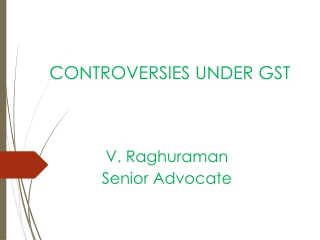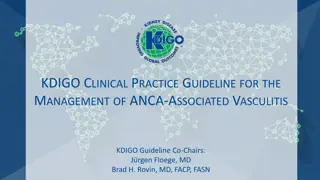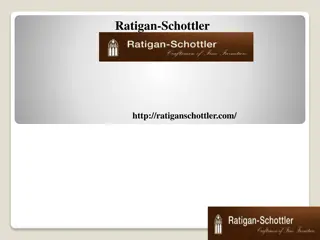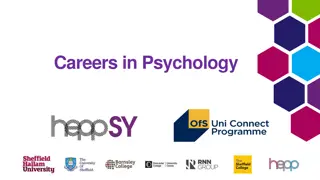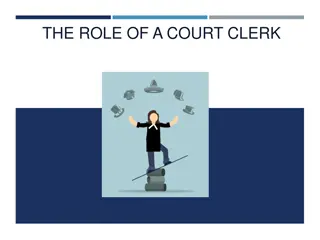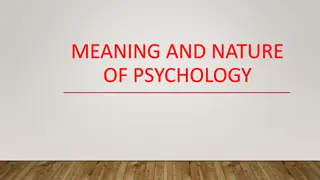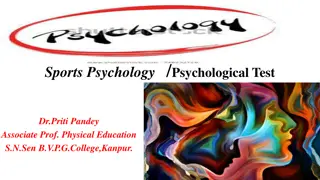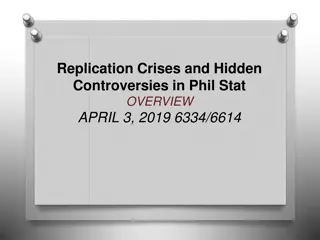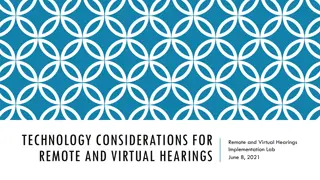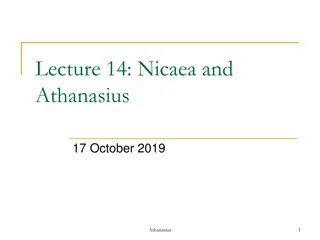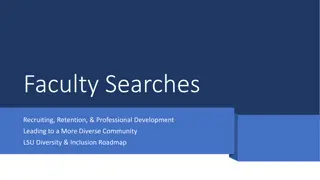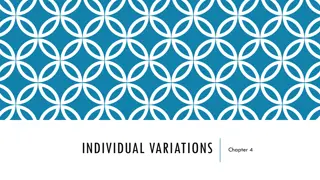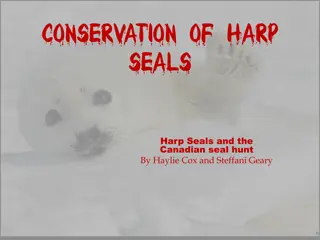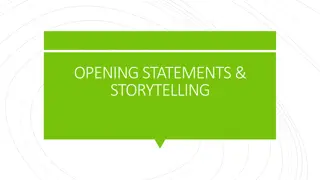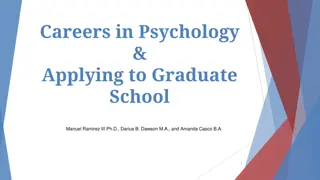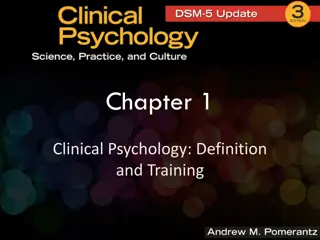Psychology in the Courtroom: Critical Issues and Controversies
Explore the critical issues and controversies surrounding psychology in the courtroom, contrasting roles in clinical and forensic psychology, and essential practices for engaging, identifying, examining, and analyzing information in legal settings.
Download Presentation

Please find below an Image/Link to download the presentation.
The content on the website is provided AS IS for your information and personal use only. It may not be sold, licensed, or shared on other websites without obtaining consent from the author. Download presentation by click this link. If you encounter any issues during the download, it is possible that the publisher has removed the file from their server.
E N D
Presentation Transcript
1 Psychology in the Courtroom CRITICAL ISSUES AND CONTROVERSIES
2 Presenters Pamela Auble, Ph.D., ABPP Michael Engle, J.D., Esq. Scott Gale, Ed.D. Julie Gallagher, Ph.D., ABPP Karen Milliner, Psy.D. James S. Walker, Ph.D., ABPP Shannon Walker, J.D., Esq.
3 Clinical and Forensic Psychology: Contrasting Roles CONFLICTS AND CRITICAL DIFFERENCES Karen Milliner, Psy.D. Scott Gale, Ed.D.
4 Initiating the services Meeting the client Introducing the process Obtaining informed consent Explaining the limits of confidentiality Establishing rapport Engaging the client
5 Engaging the client Empathizing with the client Validating the client s perspective Approaching the client with neutrality Detaching from the client s story Setting the parameters of the relationship Clarifying the purpose of the relationship
6 Identifying the client Helping the client Helping the court Identifying the client Addressing the referral questions Allowing the client to lead the conversation Imposing structure on the interaction
7 Examining the client Collecting information about the client Interviewing the client Assessing for mental illness Focusing on the specific mental capacity Capturing precise information Capturing sufficient information
8 Gathering information Including collateral sources of information Actively seeking information Carefully reviewing records Seeking objective and subjective information Corroborating the client s story Substantiating clinical findings Exploring alternative explanations
9 Analyzing information Relying solely on self-report Assessing the accuracy of information Critically analyzing information Scrutinizing collateral information Assuming the accuracy of records Assuming the accuracy of others reports Considering information objectively
10 Arriving at conclusions Considering secondary gain Assessing response style Approaching cases consistently Approaching cases impartially Clinical decision making Needing specialized knowledge Communicating findings
11 Suggested reading and references American Psychological Association. (2013). Specialty Guidelines for Forensic Psychology. American Psychologist, 68, 7-19. Goldstein, A. M. (Ed.). (2003). Handbook of psychology: Volume II Forensic psychology. Hoboken, New Jersey: John Wiley & Sons. Goldstein, A. M. (Ed.) (2007). Forensic Psychology: Emerging Topics and Expanding Roles. Hoboken, New Jersey: John Wiley & Sons. Greenberg, S. & Shuman, D. (1997). Irreconcilable conflict between therapeutic and forensic roles. Professional Psychology: Research and Practice, 28, 50-57. Greenberg, S. & Shuman, D. (2007). When worlds collide: therapeutic and forensic roles. Professional Psychology: Research and Practice, 38, 129-132. Melton, G. B., Petrila, J., Poythress, N., & Slobogin, C. (2007). Psychological evaluations for the courts: A handbook for mental health professionals and lawyers (3rd ed.). New York, NY: Guilford Press.
12 Conflicting Roles PRESERVING YOUR INTEGRITY James Walker, Ph.D.
13 What s a Forensic Psychologist For? FRE 702 expert testimony must be based upon sufficient facts or data, must be the product of reliable principles and methods, and must be offered by a witness who has applied the principles and methods reliably to the facts of the case. Daubert v. Merrill Dow Pharmaceuticals In Tennessee, McDaniel v. CSX Transportation Cases provide basis for a helpfulness standard Expert s job is to educate the court Information must be based upon sound scientific data and principles
14 McDaniel v. CSX Transportation Whether the scientific evidence has been tested and the methodology with which it has been tested. Whether the evidence has been subjected to peer review or publication. Whether a potential error rate is known. Whether the evidence is generally accepted in the scientific community. Whether the expert s research in the field has been conducted independent of litigation.
15 (Physicians excepted) T.C.A.Sec. 24-7-115 "In the trial of any civil suit, there shall be received in evidence if offered on behalf of any party thereto, opinions as to medical findings as a result of treatment or examination of the party, whether such opinions are based on subjective or objective findings; provided such opinions are those of persons otherwise qualified as medical experts. It is declared to be the intent of this section that medical opinions based on subjective findings are no longer to be excluded from evidence whether the opinion is from the treating expert or an expert called in for purposes of examination and evaluation."
16 Possible Roles for the Psychologist Evaluating Expert Subsequent Evaluating Expert Reviewing Consultant Consultant Advocate All hired guns Is it ever acceptable to combine roles?
17 Dangerous Ground Prepping litigants for testing Serving as a jury consultant (if already an expert) Testifying only on one side of an issue Suppressing data Cherry picking data Offering conflicting opinions in different cases Assassinating other professionals characters Accepting cases on contingency Entering any advocacy role
18 Avoiding Ethical Conflicts Maintain your principles Never, ever, view yourself as an advocate for one side Your side is the truth Be honest Protect testing information and procedures Always be willing to share data Always be willing to meet with the other side if permitted Be empathetic will everyone Avoid sympathetic identification
19 Unprincipled hired guns Consistently testify for one side (without good reason) Money trumps the truth Tests are chosen based on bias (15 Item, TOMM, MCMI, NEOPI-R) Only supportive data is cited or mentioned Are concerned about the attorney s favor Won t answer direct questions on cross Are a blight on our profession and the justice system
20 Principled hired guns Are pains to work with ( It s not my problem ) Prepare well Answer questions truthfully Consider all the data Avoid sympathetic identification with anyone Will share information with anyone, anytime, anywhere if permissible (including raw test data) Say I don t know if they don t Include both confirmatory and contradictory information in their reports Are always busy
21 Principled Report Writing Be timely with your reports Be willing to write a report for both sides and the court, if requested Agree on report format, and stick to it Be willing to alter your reports or produce an addendum if you made an error Avoid altering conclusions Include appropriate information; don t include inappropriate information Provide both confirmatory and contradictory evidence Offer firm conclusions whenever possible, and don t change them
22 Forming and explaining conclusions Conclusion: Mr. A represents a low risk for future sexual violence Information in support: Mr. A has no prior convictions, no history of nonsexual violence, no history of stranger victims, no history of unrelated victims, no history of male victims, has been married for 28 years, is over the age of 25, has no serious mental illness, and is presently cooperating with treatment Negative information: Mr. A has a substance abuse problem, has a history of a serious head injury, and runs a hobby store where children are often present STATIC 99 calculations show that he is a low risk for future offending
23 Forming and explaining conclusions Conclusion: Mr. B is not fit for duty Negative information: Mr. B has worked at his job successfully for the past 16 years, he has several certifications, he has a college degree in the field, and he is very motivated to do a good job. He has been devastated by his employer s suspension of him Positive information: Mr. B achieved a scaled score of 62 on the Wechsler Memory Scale Delayed Memory Index, was unable to achieve any categories on the Wisconsin Card Sort, and IQ testing suggests a 10 point decline. Family report severe day-to-day memory difficulties. He has early Alzheimer s disease, and will only get worse with time.
24 Forming and explaining conclusions Conclusion: Mr. C was not able to premeditate the killing of his stepson. Negative information: He has average IQ, is college-educated, is normally capable of good reasoning and planning skills, and the day prior to the offense had remarked to his work associates that he wanted to kill his stepson. Positive information: At the time of the offense, Mr. C had consumed half a fifth of vodka in less than 2 hours time, was enraged to learn that his stepson had wrecked his vehicle, and had been struck three times in the head by his stepson with a hammer
25 Conclusions There is nothing inherently evil or mercenary about forensic consulting or the justice system The justice system needs us Biased experts are a real problem The law and psychology speak different languages; if you choose to be a forensic consultant, you have to learn both Delineate roles openly and formally whenever necessary Whatever role you find yourself playing in the forensic world, stick by your principles, and all will be well
26 Forensic Controversy: Expert Testimony THE ULTIMATE ISSUE ISSUE
27 Forensic Controversy: Expert Testimony The Ultimate Issue Issue Julie A. Gallagher, Psy.D. ABPP Board Certified in Forensic Psychology dr.julie.gallagher@gmail.com
28 What is an Ultimate Opinion? Levels of Inference Relationship of your clinical formulation or diagnosis to the legally relevant behavior Elements of the ultimate legal issue (penultimate opinion) Ultimate legal issue 1. 2. 3. Embraces society s values & moral judgments ABA Criminal Justice Standard 7-3.9: The expert witness should not express, or be permitted to express, an opinion on any question requiring a conclusion of law or a moral or social value judgment properly reserved to the court or the jury.
29 What is the standard of practice? Most legal and psychological commentators are against giving ultimate opinions Morse (1978) Heilbrun (2001) Grisso (2003) Melton et al. (2007) Specialty Guidelines neither endorse nor prohibit Borum & Grisso (1995) survey: Only 20% of those surveyed thought ultimate opinions did not belong in criminal forensic reports
30 Federal Rules of Evidence Rule 704 a) Except as provided in subdivision (b), testimony in the form of an opinion or inference otherwise admissible is not objectionable because it embraces an ultimate issue to be decided by the trier of fact. b) No expert witness testifying with respect to the mental state or condition of a defendant in a criminal case may state an opinion or inference as to whether the defendant did or did not have the mental state or condition constituting an element of the crime charged or of a defense thereto. Such ultimate issues are matters for the trier of fact alone.
31 Tennessee Rules of Evidence Rule 704 Testimony in the form of an opinion or inference otherwise admissible is not objectionable because it embraces an ultimate issue to be decided by the trier of fact. T.C.A. 39-11-501: No expert witness may testify as to whether the defendant was or was not insane.
32 Argument Against Even if a court permits such an opinion to be admitted as a matter of law, it should not be offered as a matter of professional ethics because of the explicit or implicit misrepresentation of the limits of expertise involved when a clinician acting as an expert witness gives a legal opinion in the guise of mental health knowledge. (Melton et. al. 2007)
33 Argument Against APA Ethics Code Principle A: Beneficence and Nonmaleficence Forensic Specialty Guidelines 11.02 Differentiating Observations, Inferences, and Conclusions In their communications, forensic practitioners strive to distinguish observations, inferences, and conclusions. Forensic practitioners are encouraged to explain the relationship between their expert opinions and the legal issues and facts of the case at hand.
34 Argument For Research indicates that most judges and attorneys prefer conclusory testimony Rogers & Ewing (1989 & 2003) unintended consequences to avoiding ultimate opinions Obfuscates the expert s data Results in expert testimony that is too broad and not relevant to the legal issue Makes cross-examination more difficult Provides greater opportunity for attorneys to distort testimony Loss of the distinction between clear cut cases and borderline ones
35 Levels of Inference Examples from Clark v. Arizona: Mr. Clark believed that the police officers were aliens and the only way to stop them was with bullets. Thus he did not understand that he was shooting a human being. Mr. Clark was suffering from a severe mental disease and could not appreciate the wrongfulness of his conduct. Mr. Clark was insane at the time of the crime. 1. 2. 3.
36 What if it is demanded? It should be described as a legal, moral or common-sense judgment, not a psychological one. (Melton et al)
37 My ultimate opinion on the ultimate opinion Whatever form of opinion statement you use, you should clearly describe: 1. The data on which your opinion is based 2. The logical inferences that link your data to your opinion Always show your work
38 Being an Effective Expert Witness PAMELA AUBLE, PH.D.
39 Perceptions of Experts Jurors often see lay witnesses as more credible than experts Demeaning statements regarding mental health experts by attorneys and judges Experts for sale ( hired guns ) Experts as biased ( partisans, advocates ) Experts as advocating junk science ( voodoo psychobabble )
40 What makes an expert believable? Character Credibility factors Nice Person Efficacy Poise and confidence Extraversion Communication style Only Character influenced juror decisions
41 Demeanor Dress Posture and body language Do not just look at questioner Never show anger Gentle and rare humor
42 Communication Use of jargon Audio visual aids Saying you don t know Thoughtful responses
43 Preparation Review your file Relevant literature Organize your file
44 Direct examination Meet or talk with the attorney who is doing your examination Watch out for undue influence Limits of testimony Ensure understanding of relevant legal issues and their application Communicating qualifications
45 Cross examination Teaching metaphor Pacing responses Honesty and responsiveness This is not about winning Dealing with personal attacks
46 Response techniques Discussed by Stanley Brodsky, Ph.D. Admit-deny technique Push-pull technique Silence
47 Mock Court Appearance MARK PHILLIPS, PH.D. MIKE ENGLE, J.D. SHANNON WALKER, J.D.

 undefined
undefined


